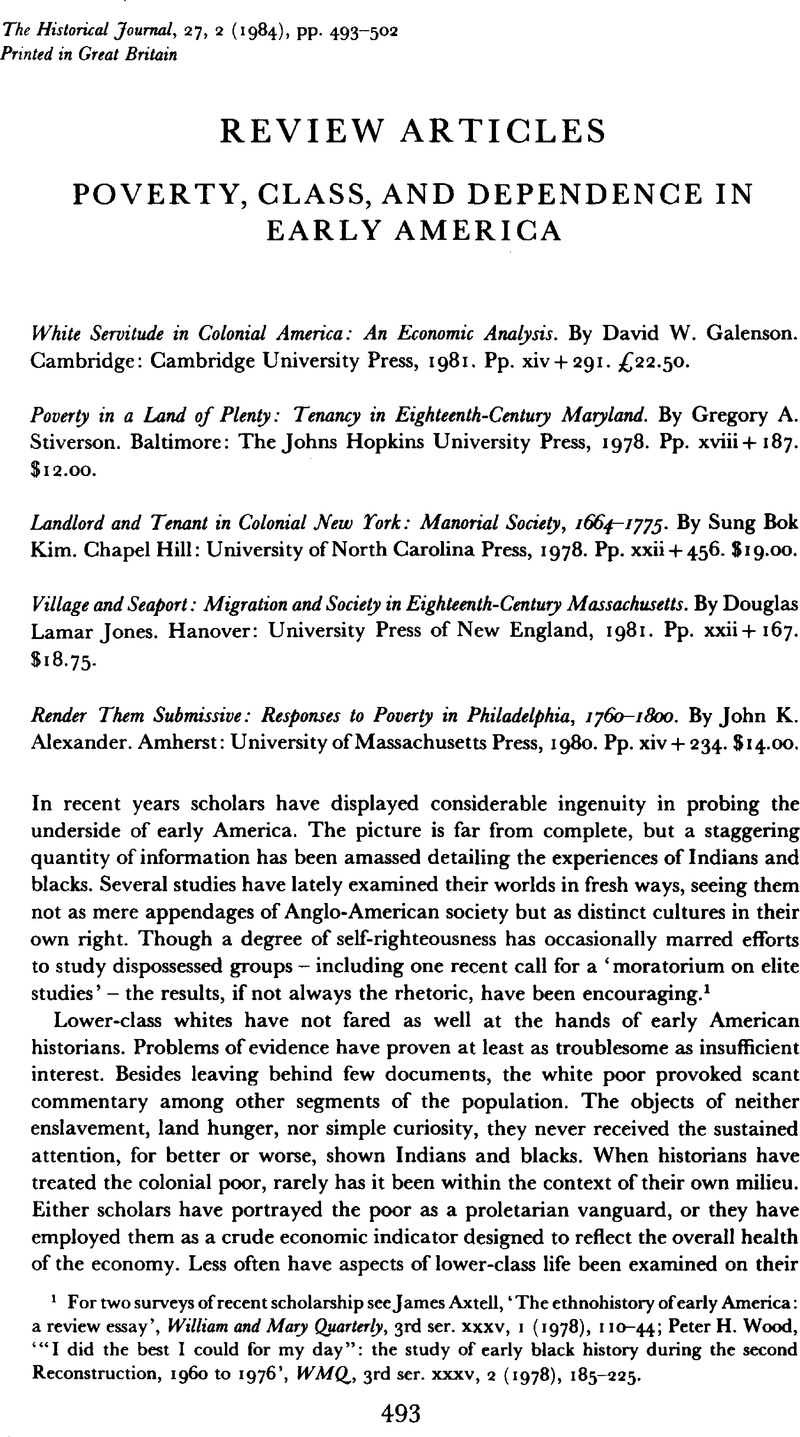No CrossRef data available.
Article contents
Poverty, Class, and Dependence in Early America
Published online by Cambridge University Press: 11 February 2009
Abstract

- Type
- Review Articles
- Information
- Copyright
- Copyright © Cambridge University Press 1984
References
1 For two surveys of recent scholarship see Axtell, James, ‘The ethnohistory of early America: a review essay’, William and Mary Quarterly 3rd ser. xxxv, 1 (1978), 110–44CrossRefGoogle Scholar; Wood, Peter H., ‘“I did the best I could for my day”: the study of early black history during the second Reconstruction, 1960 to 1976’, WMQ, 3rd ser. xxxv, 2 (1978), 185–225CrossRefGoogle Scholar.
2 Menard, Russell R., ‘From servants to slaves: the transformation of the Chesapeake labor system’, Southern Studies, xvi, 4 (1977), 355–90Google Scholar.
3 See especially Menard, Russell R., ‘From servant to freeholder: status mobility and property accumulation in seventeenth-century Maryland’, WMQ, 3rd ser. xxx, 1 (1973), 37–64CrossRefGoogle Scholar; Carr, Lois Green and Menard, Russell R., ‘Immigration and opportunity: the freedman in early colonial Maryland’, in Tate, Thad W. and Ammerman, David L., eds., The Chesapeake in the seventeenth century: essays on Anglo-American society and politics (Chapel Hill, 1979), pp. 206–42Google Scholar; Walsh, Lorena S., ‘Servitude and opportunity in Charles County, Maryland, 1658–1705’, in Land, Aubrey C. et al. , eds., Law, society, and politics in early Maryland (Baltimore, 1977), pp. 111–33Google Scholar.
4 Berthoff, Rowland and Murrin, John M., ‘Feudalism, communalism, and the yeoman freeholder: the American Revolution considered as a social accident’, in Kurtz, Stephen G. and Hutson, James H., eds., Essays on the American Revolution (Chapel Hill, 1973), pp. 256–88Google Scholar.
5 Mark, Irving, Agrarian conflicts in Colonial New York, 1711–1775 (Port Washington, 1965 [orig. publ. New York, 1940]), pp. 115–30Google Scholar; Lynd, Staughton, ‘Who should rule at home? Dutchess County, New York, in the American Revolution’, WMQ, 3rd ser. xvni, 3 (1961), 330–59CrossRefGoogle Scholar.
6 Lockridge, Kenneth A., A Mew England town: thefirst hundredyears (New York, 1970)Google Scholar, ‘Land, population, and the evolution of New England society 1630–1790’, Past and Present, XXIX (1968), 62–80Google Scholar; Gross, Robert A., The Minutemen and their world (New York, 1976)Google Scholar; and Jones, Douglas Lamar, ‘The strolling poor: transiency in eighteenth-century Massachusetts’, Journal of Social History, vIII, 3 (1975), 28–54CrossRefGoogle Scholar. The concept of ‘Europeanization’ belongs to Lockridge.
7 The urban crucible: social change, political consciousness, and the origins of the American Revolution (Cambridge, Massachusetts, 1979)Google Scholar. See also Smith, Billy G., ‘The material lives of laboring Philadelphians, 1750 to 1800’, WMQ, 3rd ser. xxxvm, 2 (1981), 163–202CrossRefGoogle Scholar.


